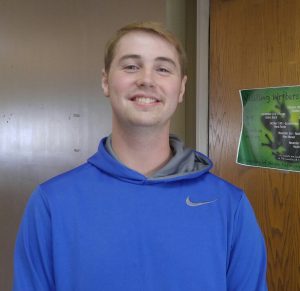Sep 29, 2020 | Feature |
by Sydney Beecher Contributing Writer
During the COVID-19 pandemic, students majoring in Elementary Education have been completing their practicums through placements in online programs and in-person placements.
All students majoring in Education must go through practicum, a combination of seminars and hands-on classroom experiences, in order to graduate within their program. The seminars are designed to teach students educational theories and practices that they can apply to their future classrooms. Students are also placed in a classroom in the Farmington region where they will spend up to 10 hours a week working with students and a mentor. The main goal of practicums are to bridge the gap between education courses and student teaching.
Because of the challenges COVID-19 presents to in-person learning, practicums have undergone a handful of changes in order to adjust to online learning. Ashley Clark, a junior majoring in Elementary Education and completing her practicum this fall, said one of the biggest changes that were made this year was the placement of students. “There wasn’t a lot of in-person placement,” she said. “Out of the 24 of us in my seminar, half of us were placed in Mallet [Elementary School] and the other half were placed in this new online academy.”
This online academy, which Clark was placed at, was introduced by the Mt. Blue Region for students whose parents did not want them attending in-person schooling.
Within the online academy, there are 12 advanced practicum students from UMF, teachers who will act as mentors, an administrator, and reading, writing, and math specialists from Mallet Elementary School. One of the biggest issues Clark worries about is the communication, as she believes she’ll have trouble effectively communicating through technology. “I asked to be placed in kindergarten,” Clark said, “so for me, it could mean that I join the classroom for morning meeting, I read a book out loud to them, or help students one-on-one if they’re having trouble.”
On the other hand, elementary education students who are completing their practicums in-person, such as senior Elise Guerrette, are attempting to adjust to the new reality of being in a classroom environment. “I had to wear a mask and face shield whenever I was closer than three feet to a student,” she said, “and it was hard to read facial expressions.” Guerrette, who was placed at Spruce Mountain Elementary School in Jay, also mentioned how bare the classroom was since most things had to be put away.
Despite all of the challenges and adjustment practicums face this semester, Guerrette feels that her unique practicum experience will benefit her in the long run. “My practicum experience will really help me in the future, especially since I am going to be teaching next year!” she said.

Oct 27, 2017 | News |
By Andrew Devine – Editor-in-Chief
The UMF Aspiring Educators of Maine (AEM) hosted a panel of teachers to discuss horror stories, life lessons, and experiences that came from working in the classroom.
The panel consisted of teachers of all levels: Dan Ryder and Andrea Palmer, who have been teaching for about twenty years, high school and first grade respectively, Chelsey Oliver, a first-year teacher and recent graduate from UMF, and Elaine Grant, a retired teacher that taught for nearly 40 years.
The program started with a potluck style dinner to which all attendees were invited. Following the meal, the panel began with a light-hearted question that led to some serious answers: “What is your favorite story to tell about teaching?”
Most responses from the panelists resulted in profound lessons that the group had gathered over what amounted to over 80 collective years of teaching. Dan Ryder, an English teacher at Mt. Blue High School for nearly 20 years, included some of these important responses.
“You can be friendly without being a friend,” and “You have to be authentic, and figure out what that means exactly,” were some of the lessons Ryder shared with the club.
Students in attendance seem to have taken in important lessons pertaining to their future careers from the event.
Bradley Howes, a sophomore Secondary Education student who worked with Ryder during his practicum, said, “What I took away from it is, you’re going to screw up many times in your first, second, and third years; the point is you have to go with it and own it.”
On the horror theme of the event, Bryan Eldridge, a member of AEM, said: “Kids aren’t scary; kids are only scary if you make them scary.”

Stephen Riitano, President of UMF Aspiring Educators of Maine.
(Photo courtesy of Andrew Devine)
Stephen Riitano, President of UMF Aspiring Educators of Maine, helped organize the event and led the panel on stage in the Landing. Riitano said, despite the title of the event, which is a spin on the 1980s television program: ‘Tales From the Crypt’, it was not meant to be a scare.
“I think the big thing was a balance between horror stories and what is rewarding and informative about teaching.” Riitano said, “If we had just done an hour full of the worst that can happen, it might come as turning some people off.”
AEM has held similar events in the past, under former name Student Maine Educators Association, and hopes to continue work in aiding students in their advancement towards work in the education field.
“It’s usually an annual event that Aspiring Educators does,” said Riitano. “Last year it really wasn’t that big, there were only five or six people in the Ed Center lobby, so it was great to have 65 people show up.”
This event, and the high attendance, shows the progress the club has shown since the start of the school year.
The club will be hosting an event focusing on Special Education in November.
